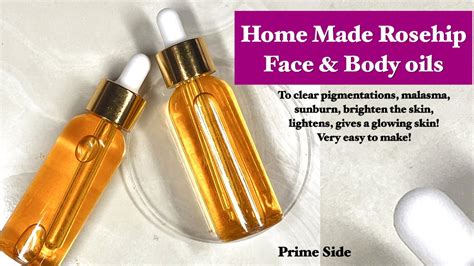DIY Rosehip Oil: A Natural Remedy for All Skin Types
Rosehip oil, extracted from the seeds of rose bushes, has surged in popularity due to its remarkable skin benefits. Packed with vitamins, antioxidants, and essential fatty acids, it's a versatile oil suitable for various skin types, addressing concerns from acne scars to wrinkles. While readily available commercially, making your own rosehip oil offers a rewarding experience and allows for complete control over the ingredients. This guide provides a comprehensive approach to DIY rosehip oil production, addressing common questions and concerns.
What are the benefits of rosehip oil for the skin?
Rosehip oil's benefits stem from its rich composition. It's a powerhouse of Vitamin C, a potent antioxidant that protects against free radical damage, leading to brighter, more even-toned skin. It's also rich in Vitamin A (retinol), promoting cell turnover and reducing the appearance of fine lines and wrinkles. The essential fatty acids, linoleic and linolenic acid, help to hydrate the skin, reduce inflammation, and improve skin elasticity. These combined properties make it effective for a range of skin issues, including:
- Acne scars: Rosehip oil's regenerative properties help to fade acne scars and blemishes.
- Wrinkles and fine lines: Its retinol content stimulates collagen production, improving skin texture and reducing the appearance of aging.
- Hyperpigmentation: The antioxidants help to even out skin tone and reduce the appearance of dark spots.
- Dry and dehydrated skin: The fatty acids deeply hydrate and nourish the skin, improving its barrier function.
- Eczema and psoriasis: Its anti-inflammatory properties can soothe irritated skin and reduce redness.
How can I make rosehip oil at home?
Making your own rosehip oil is a relatively simple process, although it requires patience. The most common method involves the cold-pressed extraction of oil from the seeds. However, this requires specialized equipment. A more accessible method for home use is the infusion method, which requires readily available materials:
Materials:
- Dried rosehips (organic and pesticide-free are recommended)
- Carrier oil (such as olive oil, sweet almond oil, or grapeseed oil)
Instructions:
- Prepare the rosehips: Ensure the rosehips are thoroughly dried and clean. Remove any stems or extraneous material.
- Fill a jar: Place the dried rosehips in a clean, dark glass jar, filling it about ¾ full.
- Add the carrier oil: Pour the carrier oil over the rosehips, ensuring they are completely submerged. Leave about ½ inch of space at the top of the jar.
- Seal and store: Seal the jar tightly and store it in a cool, dark place away from direct sunlight.
- Infuse: Allow the mixture to infuse for at least 4-6 weeks, shaking the jar gently every few days. The longer it infuses, the more potent the oil will become (up to 8 weeks is ideal).
- Strain: After the infusion period, strain the oil through a fine-mesh sieve or cheesecloth to remove the rosehip seeds.
- Store: Store the finished rosehip oil in a dark glass bottle in a cool, dark place.
Is homemade rosehip oil as effective as store-bought?
While homemade rosehip oil may not contain the same concentration of active compounds as commercially produced, cold-pressed oils, it still offers many of the same benefits. The effectiveness will depend on the quality of the rosehips and the carrier oil used. Using high-quality, organic ingredients will maximize the potential benefits. It's also crucial to remember that results can vary depending on individual skin types and concerns.
How long does homemade rosehip oil last?
Homemade rosehip oil, when properly stored in a dark, cool place, typically lasts for 6-12 months. However, it's essential to monitor it for any signs of rancidity, such as a change in color, smell, or texture. If you notice any changes, discard the oil.
What are the potential side effects of using rosehip oil?
Rosehip oil is generally well-tolerated, but some individuals may experience mild side effects like redness or irritation. It’s advisable to perform a patch test before applying it to a larger area of skin. If you have a known allergy to roses or rose products, avoid using rosehip oil.
Can I use rosehip oil on my face every day?
Most people can use rosehip oil on their face daily, but starting with a small amount and gradually increasing the application is recommended. Listen to your skin; if irritation occurs, reduce the frequency of application.
Can I use rosehip oil for other purposes besides skincare?
While primarily known for its skincare benefits, rosehip oil’s antioxidant and anti-inflammatory properties may offer potential benefits for hair and nails as well, though more research is needed to confirm this.
By following these steps and tips, you can create your own potent and effective rosehip oil, reaping the numerous benefits it offers for your skin naturally and affordably. Remember, patience and quality ingredients are key to success.

